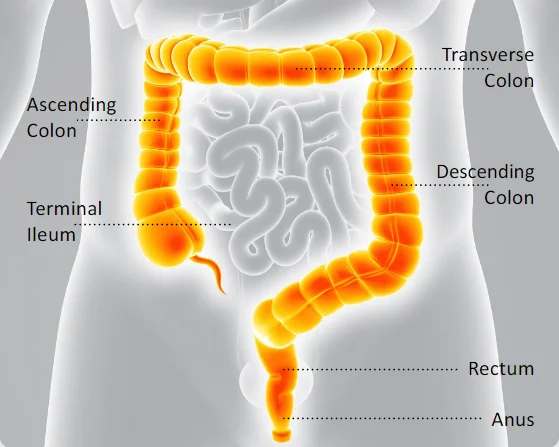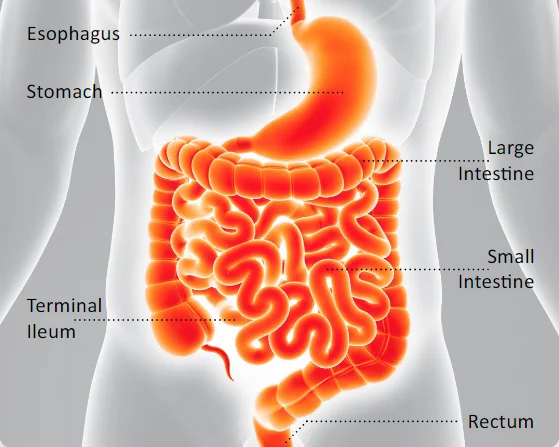INFLAMMATORY
BOWEL
DISEASE
Living with Inflammatory Bowel Disease
Finding IBD Treatments
Have you been searching for a highly trained gastroenterologist who can answer your questions about inflammatory bowel disease treatments? Or maybe you would like a proper IBD diagnosis. Either way, at GI of the Rockies, our team of doctors will listen to you and prove how much they care. We are here to help you find the right IBD doctor in Denver – or connect you with our doctors who treat patients in six additional GI clinics in Boulder, Broomfield, Lafayette, Lakewood, Longmont, and Northglenn. Click our branch locations page to find one of our IBD doctors in your neighborhood.
When we discuss Inflammatory Bowel Disease (IBD), it’s easier to think of it as an umbrella term that includes Ulcerative Colitis (UC) and Crohn’s Disease (CD). Both of these chronic digestive conditions are characterized by symptoms like inflammation and GI distress at different locations in the GI tract.
- Ulcerative Colitis generally targets the large intestine, AKA colon
- Crohn’s Disease can target any location along the GI tract, although it commonly targets the small intestine and may target multiple locations of the intestine [Source: Hopkins Medicine]
Common IBD symptoms include abdominal pain, diarrhea, weight loss, urgency to defecate or fecal incontinence. This page provides information to help you better understand IBD so you can discuss IBD symptoms and explore treatment options with your GI specialist.
Ulcerative Colitis • UC

Limited to the colon
- Starts in rectum and extends up colon
- Diffuse, continuous pattern of inflammation
- Mucosa (surface lining) involvement
Crohn’s Disease • CD

Anywhere from the mouth to anus
- Patchy distribution of inflammation
- Transmural inflammation (full thickness of gut lining = deeper inflammation)
- Most commonly affects terminal ileum & colon
Symptoms
Gastrointestinal
Diarrhea
Abdominal pain
Nausea/vomiting
Mucus/blood in stool
Bloating
Incomplete evacuation
Urgency
Incontinence
Rectal pain
Systemic
Fever
Weight loss
Fatigue
Anxiety/Depression
Note: IBD symptoms can be similar to IBS
Extraintestinal Manifestations
Joints (Arthritis, Ankylosing Spondylitis)
Skin (Erythema Nodosum, Pyoderma)
Eyes (uveitis) Oral ulcers (Apthae)
Most At Risk
Young Adults Aged 15-35
25% of people with IBD develop the disease before the age of 18.
3.1 million adults (1.3%) in the U.S. are diagnosed with IBD, incidence is increasing both in U.S. & worldwide.
Potential diagnosis at any age
Treat To Target Strategy
1
Use Steroid-Sparing Strategy To Treat Symptoms
Decrease bleeding, frequency, urgency, pain, etc.
2
Decrease Inflammation
Assessed by blood/stool biomarkers, endoscopic assessment (mucosal healing = bowel healing)
!
Aspirational Goal = Functional Remission
Having the patient get control of their life again, so they can get back to work, social life, travel, and family gatherings. Gastro of the Rockies has multiple advanced therapies available with varying mechanisms of action and modes of administration (oral, IV, subcutaneous) to target inflammation and treat patients with IBD.
IBD & IBS: Similarities & Differences
Inflammatory Bowel Disease (IBD) is the inflammation or destruction of the bowel wall, leading to sores and narrowing of the intestines. It is a structural disease where physical damage causes symptoms. Doctors can see chronic inflammation or ulcers when they inspect the gut.
Irritable Bowel Syndrome (IBS) is a disorder of the gastrointestinal (GI) tract. It is a functional disease, which means that tests such as a colonoscopy, stool or blood tests won’t show any physical reason for symptoms. It’s possible to have both IBD and IBS.
IBD Symptoms
- Loss of appetite/weight loss
- Inflammation of skin, joints, or eyes
- Fever
- Bloody/black Stool
- Anemia
- Fatigue
Main Difference
- Visible inflammation in examination
- Can get progressively worse
-
Risk of colon cancer, surgery, hospitalization
Shared Symptoms
- Diarrhea
- Abdominal Pain
- Cramping
- Bloating
IBS Symptoms
- Nausea
- Gas
- Bloating/cramping
- Trouble Sleeping
- Fatigue
- Constipation
Main Difference:
- No visible changes seen during examination
Dr. Joshua Steinberg: Director of IBD
Joshua M. Steinberg, MD, is the Director of IBD with advanced IBD training from the University of Chicago. Dr. Steinberg takes a comprehensive approach in treating patients with Crohn’s and Ulcerative Colitis, ranging from mild to severely complex disease.





